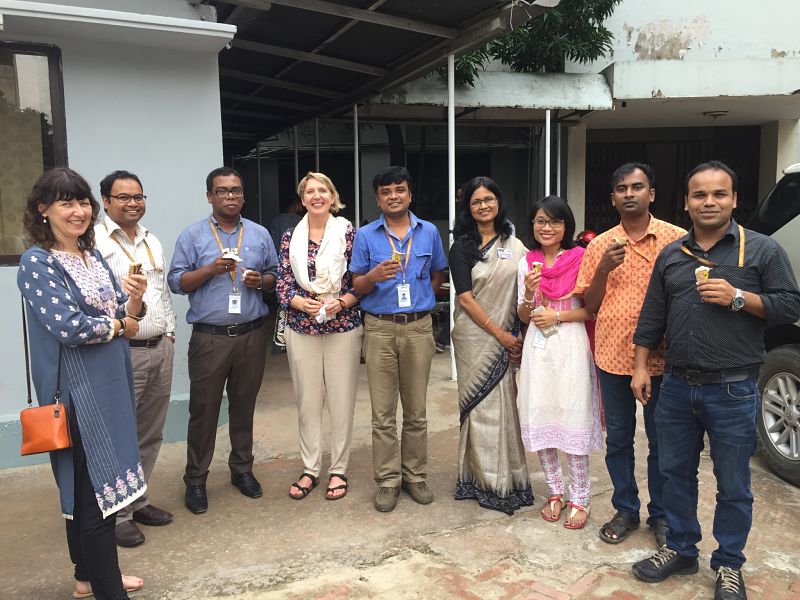Pathways of antibiotic use among people and animals in Bangladesh – the PAUSE study
The findings of this study will inform government policy makers and identify pathways for developing interventions to improve the provision and use of antibiotics in the community
What is the problem?
In order to slow the spread of antibiotic resistance, we need to improve the use of existing antibiotics. In the global context, introduction of greater control around the prescribing and ready availability of antibiotics must be balanced with the need for access to health for the disadvantaged.
The availability of over-the-counter antibiotics for humans and animals, purchased from an array of public, private, unregulated or loosely regulated healthcare and medicine providers, are significant contributors to the development of antibiotic resistance in Bangladesh and the wider South East Asia region. Understanding the behaviour and priorities of these providers, and the needs of consumers who use them is therefore central to developing an effective AMR strategy. In Bangladesh, we know that retail drug shops are the preferred first point of contact for meeting the health needs of a majority of the population. Previous studies suggest that 63% of prescriptions for antibiotics are from practitioners with no qualifications. There is relatively little research, however, which seeks to understand the needs and behaviours of people and providers, or the extent of awareness of antibiotic resistance in resource poor, south Asian contexts.
How are we addressing this problem?
PAUSE is an integrated study that considers the behaviours of lay people surrounding antibiotic use for themselves, their family members and their livestock. It further considers the practices and priorities of formal and informal healthcare providers in urban and rural Bangladesh.
The three components of the PAUSE study are to:
1. Understand the pathways of antibiotic use and decision-making within households from the onset of illness to the purchase and consumption of antibiotics. In-depth interviews with caregivers and household decision makers are being carried out in rural and urban households.
2. Using the Social Life of Medicine approach, examine the role of qualified and unqualified private practitioners and government health services in the prescription, sale and use of antibiotics. This will be complemented by key informant interviews with representatives from the supply chain of antibiotics.
3. Use the formative research findings to inform government policy and identify pathways for developing interventions to improve the safe provision and use of antibiotics in the community.
Through in-depth interviews in urban and rural Bangladesh, we will gain a better understanding of behaviours around antibiotic prescribing and consumption as well as establishing the role of healthcare practitioners in antibiotic sale and use. By interviewing practitioners across the whole range of formal and informal outlets we will assess the potential for practitioners to change prescribing practices or act as agents of change.
Next steps and outcome
The findings will inform government policy makers and identify pathways for developing interventions to improve the provision and use of antibiotics in the community. In the final stages of the project we will work with government and non-government agencies to inform the development of interventions to reduce antibiotic use. We will use the formative research from interviews to develop culturally appropriate messages and materials for awareness-raising on antibiotic resistance. These materials will be pre-tested with lay people, healthcare providers and drug shop owners to establish the acceptability of messages.
Update: November 2019
The research is now complete. The team discovered that in Bangladesh, unregulated drug shops do potentially increase the use of antibiotics, however they also provide an essential service. Introducing regulations to interrupt this supply would risk removing essential healthcare access for many people.
Read the full published paper here: "Pathways to antibiotics in Bangladesh: A qualitative study investigating how and when households access medicine including antibiotics for humans or animals when they are ill"

Researchers involved
- Dr Patricia Lucas (School for Policy Studies)
External collaborators
- Project lead; Dr Emily Rousham (University of Loughborough)
- Dr Papreen Nahar (Durham University)
- Dr Mohamed Aminul Islam (icddr,b)
- Dr Fosiul Alam Nizame (icddr,b)
- Dr Leanne Unicomb (icddr,b)
- Prof Syed Masud Ahmed (BRAC University)
Funding
- 'Tackling AMR - A Cross Council Initiative' Theme 4: 'Behaviour within and beyond the healthcare setting' ESRC-led in partnership with the Department of Health and Department for Environment Food & Rural Affairs (ESRC-GCRF Award ES/P004563/1)
Contact
Dr Patricia Lucas
email:patricia.lucas@bristol.ac.uk
Tel: +44 (0)117 33 10866